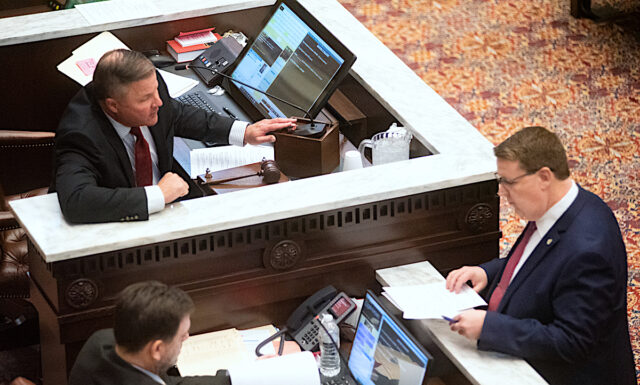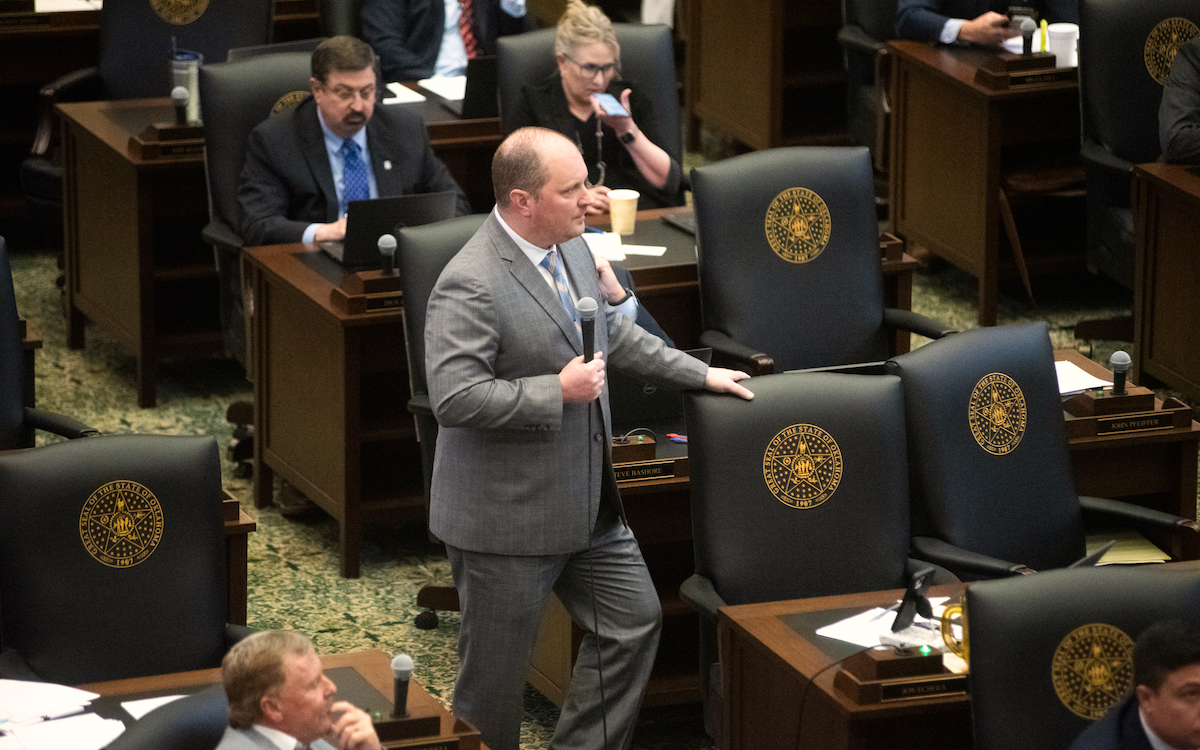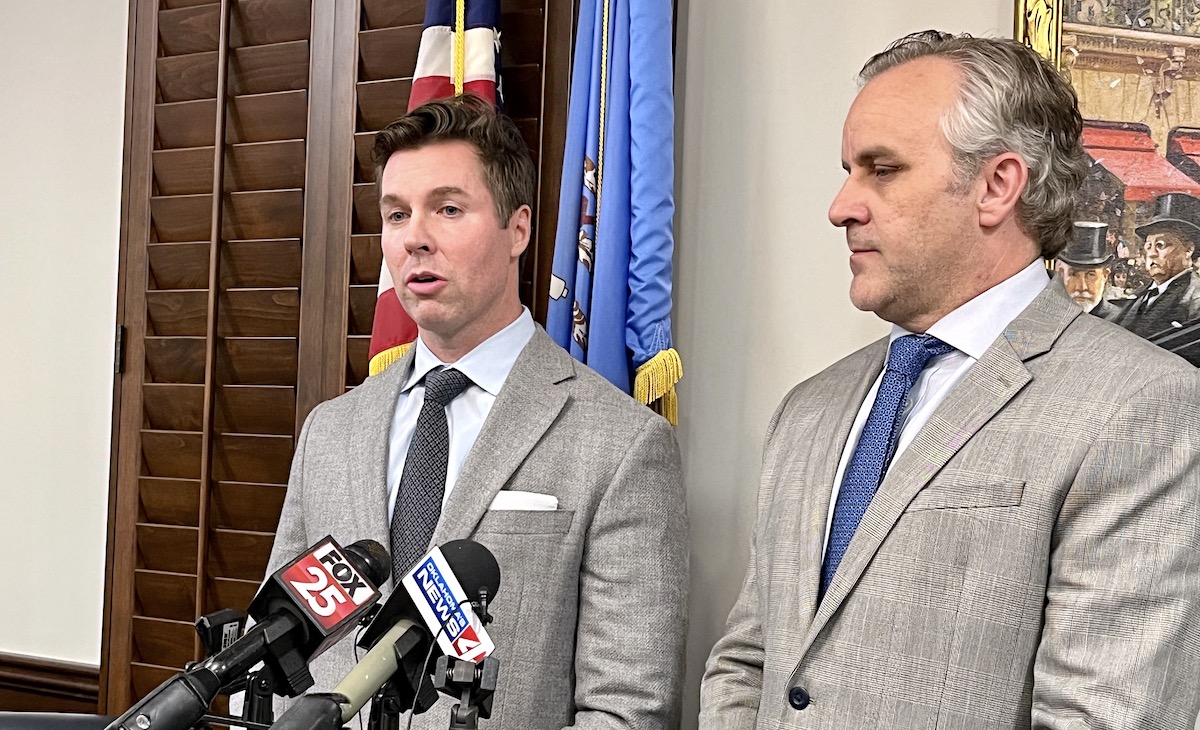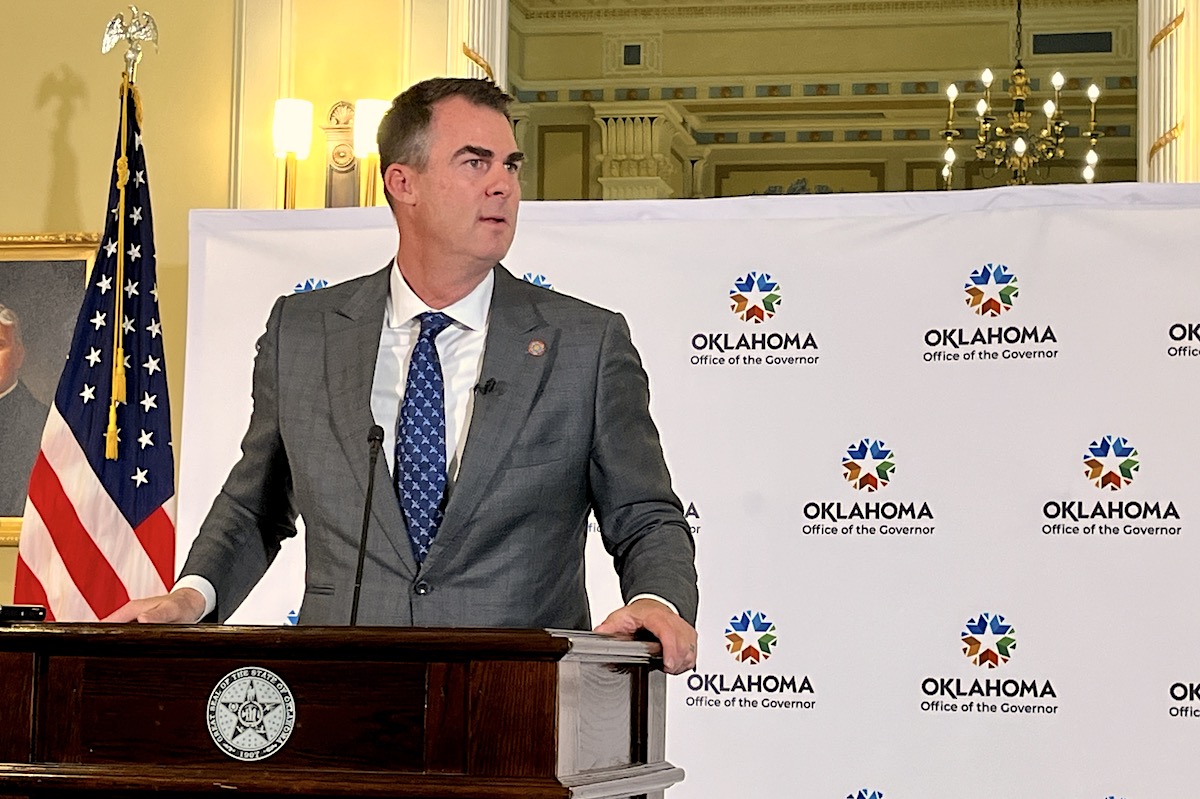

With multiple members criticizing Gov. Kevin Stitt for throwing a “tantrum” in late April when he vetoed 20 “unrelated” bills in an effort to cajole the State Senate into supporting his proposed education compromise and tax cuts, the Oklahoma Legislature overrode 19 of the governor’s vetoes Thursday and Friday.
The measures crammed down the governor’s gullet and into law despite his objections included the sunset extension of the Oklahoma Educational Television Authority, a bill allowing more flexibility in representation of collegiate athletes in name, image and likeness matters, and a measure establishing a new Oklahoma State University Veterinary Medicine Authority.
But in a series of surprising moves that emphasized the discord between House and Senate leaders this year, five bills that were part of the Legislature’s apparent budget agreement did not make it to the finish line Friday. Lawmakers adjourned their annual regular session in the 3 p.m. hour, and they adjourned their concurrent special session on budget bills until an expected return of June 12.
That day could feature more fireworks than previously anticipated owing to the failure of two House budget bills in the Senate on Friday: HB 1022X to create a new “judicial performance evaluation” program; and HB 1026X to increase future statewide elected official pay.
In response to the Senate voting down two pieces of the chambers’ supposed budget agreement, the House chose not to hear three bills:
- SB 11 to turn the Tourism and Recreation Commission back into a governing body;
- SB 22 to establish a fund and rules for the Oklahoma Museum of Popular Culture to receive $18 million contingent on matched fundraising; and
- SB 27 to direct $12.5 million to the County Community Safety Investment Fund, which was created to reallocate criminal justice reform savings to community mental health efforts in line with State Question 781.
“SB 22X and SB 27X were part of the budget deal, along with HB 1022X and HB 1026X that [the Senate] failed,” said House Appropriations and Budget Chairman Kevin Wallace (R-Wellston) after adjournment. “We’re waiting on the Senate to uphold their end of the budget deal.”
Asked his reaction to the Senate voting down the two bills, Wallace said, “It’s par for the Senate.”
“They didn’t hear all the bills last year as well. This year they kill two bills, capture them and don’t bring them back up,” Wallace said. “It is interesting to me that this week the Senate wanted to (…) extend special session to June 30 but still come in on June 12. I think I’m starting to understand why.”
Asked if he had any comment about how the budget bills were handled, Senate Appropriations and Budget Chairman Roger Thompson (R-Okemah) spoke in general terms.
“All in all, I believe that it is a good year for the people of Oklahoma,” Thompson said. “I was honored to be a small part of the process.”
One veto override fails on House floor

The House failed one veto override attempt on HB 1236, a one-word bill changing “shall” to “may” in a state law about how attorney fees and sanctions are awarded when a lawsuit is dismissed by a judge on grounds related to First Amendment protections.
“House Bill 1236 would amend the Oklahoma Citizens Participation Act, which is designed to deter lawsuits intended to chill Oklahomans’ right of free speech, right to petition and right of association. Currently, defendants who secure dismissal of lawsuits under the act are entitled to mandatory costs, attorney fees, other expenses, and potential sanctions,” Stitt said in his veto message for HB 1236. “The bill would make discretionary what is now mandatory. Such a change would undermine the act’s purpose, ensuring a greater frequency of frivolous lawsuits against Oklahomans exercising free speech. Although I would support an amendment providing for mandatory attorney fees only when a strategic lawsuit against public participation (SLAPP) is found to be frivolous, this amendment would go too far in relaxing a needed deterrent.”
When House Majority Floor Leader Jon Echols (R-OKC) presented the override on HB 1236, Rep. Danny Williams (R-Seminole) asked him whether the bill was being pushed by Paycom in connection to its pending lawsuit against the Oklahoma Council of Public Affairs.
“Would you believe that several people have told me that that goes into play here?” Williams asked. “I don’t really care about either one of those entities. What I do care about is the right of passage to get things done and not be disadvantaged as an individual versus a major corporation.”
Echols declined to answer directly, instead referencing the film Casablanca in his response.
“Would I be surprised there are rumors in the Capitol? I mean I would be shocked, shocked to learn there’s gambling in this establishment,” Echols said. “No, I would not be shocked to know that you heard a rumor. And again, I can’t speak for it one way or another.”
The House motion to override the HB 1236 veto failed 36-61, which means the bill will not become law. On Friday, 20 organizations spanning the political spectrum — from the ACLU to Americans for Prosperity — sent Stitt a letter of appreciation for his veto of HB 1236.
Senators offer sarcasm as they vote on overrides

In the Senate on Thursday morning, some lawmakers were more flippant than others in their remarks as they called up vetoed bills for override votes.
In moving to override the veto on SB 34 about youth tobacco access prevention, Senate Appropriations and Budget Vice Chairman Chuck Hall (R-Perry) started the morning off with a soliloquy about the legislative process and criticism of what he called Gov. Kevin Stitt’s 20-bill veto “tantrum” on April 26.
“I believe in government. I believe that what we do here in this building matters. I believe in the process. I believe that we introduce bills, that we hear those bills in committee, that we hear those bills on the floor, that the process repeats itself over in the House and then ultimately goes to the governor for his signature or veto,” Hall said. “Members, in my career, I have had veto messages come to me. Some of them I didn’t agree with, but at least there was a base behind it that made sense. Members, I’m reading a veto message related to this particular bill where the executive says until I get what I want I will be vetoing this unrelated policy. Members, this bill that was vetoed by the executive is not even a policy bill. All this bill does is point to references now that never existed in law before.
“And here we are taking up the time of the Senate to address a veto message that appears to me to be nothing more than a tantrum.”
Soon thereafter, Sen. Todd Gollihare (R-Kellyville) moved to override the veto on SB 123 and drew laughter from his colleagues.
“SB 123 is as simple as it sounds. There’s no logical reason nor rational thinking that can veto this bill. It’s not policy. It’s just a simple correction of a scrivener’s error scooped into a pile and discarded offhand,” said Gollihare, an attorney. “I jokingly referred to it as my landmark legislation. And maybe it is. Landmark means a case or law that is studied because it has historical (…) significance. I think to the governor’s veto, this bill achieved that status.”
Later in the morning, Hall moved to override SB 623, a bill he claimed “was a request by the governor himself.”
When Senate Floor Leader Greg McCortney (R-Ada) moved to override the veto on SB 249, he also took a dig at Stitt.
“During a recent tantrum, the chief executive of the state indicated he did not think it was important for hospice patients in nursing homes to have quick access to pain medication,” McCortney said.
To override vetoes, both chambers of the Legislature must vote with two-thirds support of their chamber to push the bill into law despite the governor’s objection. Overrides of vetoed bills must begin in their chamber of origin and then be voted on by the opposite chamber.
Thursday, Senate President Pro Tempore Greg Treat (R-OKC) discussed his reaction to Stitt’s 20 vetoes on April 26.
“I’ve said publicly and I’ve said privately to him that I thought it was beneath the dignity of his office. I haven’t wavered on that opinion,” Treat said. “That doesn’t mean I can’t work with him or have a good relationship with him, but I felt that was a very inappropriate use of that authority and power. Not that he is precluded from being able to do it, but I just thought it was an abuse of that power.”
Stitt calls override of OETA veto ‘unbelievable’

Of all the bills Stitt vetoed and that the Legislature pushed into law despite his objections, HB 2820 to extend the sunset on the Oklahoma Educational Television Authority received the most public and national attention.
“The OETA oversees the provision of educational television systems and services provided by and through various educational and cultural agencies,” Stitt wrote in his veto message for HB 2808. “Although the OETA may have played a principal role in the provision of educational television services at one time, today the OETA’s long-term, strategic value is at best unclear, if not outright imagined.”
Members of the Legislature initially expressed surprise at the OETA sunset extension veto, with some senators ultimately believing Stitt vetoed the bill as a red-meat political distraction on the same day he axed the 20 “unrelated” Senate bills.
On May 1, NonDoc requested records between Feb. 1 and April 30 from Stitt’s office for “any and all communications referencing ‘OETA,’ the ‘Oklahoma Educational Television Authority’ or ‘PBS’ sent by text message, email or memo” among, from or to:
- Stitt
- Chief of staff Brandon Tatum
- Director of communications Carly Atchison
- Press secretary Kate Vesper; and
- Secretary of State Brian Bingman.
The Stitt administration provided about 2,000 pages of responsive emails May 22. Most of the emails involved news tracking service reports that included OETA stories or references. Some emails involved an interview the governor ultimately conducted with a journalist producing a story for OETA. Other emails involved subsequent media requests and responses regarding Stitt’s veto of HB 2820, including a list of seven programs or episodes aired on OETA and PBS that referenced LGBTQ characters or issues.
None of the emails involved discussion of OETA’s sunset extension or funding prior to Stitt’s veto. One email referenced Stitt’s fall 2022 veto of American Rescue Plan Act funding the Legislature attempted to dedicate to tower upgrades for OETA. (Lawmakers did not override that veto.)
Thursday evening, Atchison, Stitt’s former communications director who departed his administration last week in effort of a national political campaign, tweeted a one-word acronym in response to the OETA veto override: RINOs, which stands for “Republicans In Name Only.”
Friday, Stitt expressed similar confusion about Republicans refusing to eliminate a public television network.
“It’s unbelievable that conservative Republicans would override that bill,” Stitt said, again saying LGBTQ issues should not be referenced in PBS content. “Using taxpayer dollars to get into these social issues, I’m just adamantly opposed to it.”
Full list of vetoes overridden by the Legislature
In all, the Oklahoma Legislature overrode Stitt’s vetoes on 19 bills, including 14 Senate bills:
- SB 249 broadens a hospice exemption for access to controlled dangerous substances;
- SB 291 modifies eligibility for the filing of petitions for emergency protective orders;
- SB 299 extends the sunset date for the Oklahoma Advisory Council on Indian Education;
- SB 429 requires Oklahoma public school districts to allow students who are tribal citizens to wear tribal regalia;
- SB 563 modifies Medicaid reimbursement rates for anesthesia;
- SB 617 modifies definitions related to where lawsuits can be filed against corporations and limited liability companies;
- SB 623 includes a series of changes regarding Service Oklahoma;
- SB 711 requires the Department of Mental Health and Substance Abuse Services to provide emergency opioid antagonists — such as naloxone — and requires the Department of Corrections and county jails to provide emergency opioid antagonists to certain persons on certain conditions;
- SB 712 requires the Department of Mental Health and Substance Abuse Services to provide emergency opioid antagonists — such as naloxone — and requires hospitals to distribute them to certain persons upon discharge;
- SB 772 creates new notification requirements to the Attorney General’s Office within 45 days of a variety of actions;
- SB 775 modifies rules regarding continuing education eligibility for county employees;
- SB 840 modifies the Student Athlete Name, Image and Likeness Rights Act to allow more people other than attorneys to represent athletes in NIL deals;
- SB 841 includes aftermarket crash part repair facilities under wrecker and towing service rates established by the Oklahoma Corporation Commission;
- SB 951 increases the travel allowance for county commissioners and sheriffs.
Five vetoes were overridden on House bills:
- HB 1843 changes from the Oklahoma Insurance Department to the Attorney General’s Office the duty to “review and approve retail pharmacy network access for all pharmacy benefits managers” in state law;
- HB 2255 is an omnibus license plate bill that Stitt vetoed owing to a proposed plate recognizing the University of Kansas;
- HB 2263 modifies membership of the Oklahoma Turnpike Commission, decreasing the gubernatorial appointees and adding appointees from leaders of both legislative chambers;
- HB 2820 extends the sunset for the Oklahoma Educational Television Authority;
- HB 2863 creates the Oklahoma State University Veterinary Medical Authority to support the College of Veterinary Medicine at OSU.
Other vetoes stand — for now
On Thursday, the House voted 68-22 to override the veto on HB 1612. But when regular session adjourned Friday afternoon, the Senate had not taken up an override vote on HB 1612, which proposes making the crime of shooting into a building used for public purposes an “85 percent” crime requiring offenders to serve that percentage of any jail term.
Echols, the House floor leader, said after adjournment that remaining vetoed bills could be considered for further overrides at the start of the 2024 regular session, which will be the second session of the 59th Legislature.
Echols said the House “could have” overrode other vetoes Friday but ultimately decided not to.
“We looked at each override one-by-one and figured out what we thought made sense and what could wait,” Echols said. “They’re all alive next session. It’s just a timing issue.”
The 13 vetoed bills that the Senate overrode but that the House did not were:
- SB 34 would modify statutory references to refer to other changes in law regarding youth access to tobacco;
- SB 58 would extend the sunset date for the board of governors for licensed architects, landscape architects and commercial interior designers;
- SB 60 would extend the sunset date for the Board of Chiropractic Examiners;
- SB 123 would clarify language related to the state’s parole process;
- SB 125 would reduce from monthly to quarterly the required frequency of meetings of the governing boards of law libraries;
- SB 162 would extend the sunset date for the Board of Examiners of Psychologists;
- SB 267 would increase membership of and broadens jurisdictional areas for the Advancement of Wellness Advisory Council;
- SB 369 would expand the list of criminal convictions and pleadings that constitute prohibition to be hired for employment at a nursing home to include human trafficking and any crime that results in registration as a sex offender;
- SB 395 would allow Oklahomans to make an income tax refund donation for Recovering Oklahomans After Disaster;
- SB 479 would codify changes in definitions about uniformed service to include service in the Space Force;
- SB 715 would modify the Open Records Act to require an agency denying a records request to provide notification of the denial. The bill also references an existing court appeal process and states a judge may order release of the records “if the court finds that the public interest in the records outweighs the privacy interest” and states the judge may award attorney fees and court costs for the requestor.
- SB 889 would modify definitions for milk to specify derivation from “hoofed mammals”;
- SB 976 would create the Invasive Species Task Force.




















